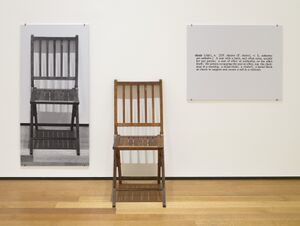User:Aitantv/FISTING: Difference between revisions
| Line 14: | Line 14: | ||
== Research == | == Research == | ||
Wiki | Joseph Kosuth, Wiki | ||
* Joseph Kosuth, "Art is not a question of forms and colors but one of the production of meaning." | * Joseph Kosuth, "Art is not a question of forms and colors but one of the production of meaning." | ||
* His activity has consistently explored the production and role of language and meaning within art. | * His activity has consistently explored the production and role of language and meaning within art. | ||
Revision as of 11:20, 15 November 2021
What is
Multimedia presentation of a mound of clay being fisted. The piece consists of three depictions of clay fisting: live action, 3D rendering, and live performance. Fisting is an accidental direct reference to Joseph Kosuth's 'One & Three Cahirs' (1965).
Critiques
- the image processing level correlates with audio processing, so the live is the most 'honest' while the 3D is the most augmented
- the three performances can be spontaneous and on their own, not in sync. This way the whole is less deterministic, more spontaneous
- a direct reference to ASMR
- the real live performance could be the most uncanny, the most processed and augmented
Research
Joseph Kosuth, Wiki
- Joseph Kosuth, "Art is not a question of forms and colors but one of the production of meaning."
- His activity has consistently explored the production and role of language and meaning within art.
- stripping art of personal emotion, reducing it to nearly pure information or idea and greatly playing down the art object
- 1966 Kosuth also embarked upon a series of works entitled Art as Idea as Idea, involving texts, through which he probed the condition of art.
- Kosuth forwards tautological statements, where the works literally are what they say they are.
- he spent time in the Trobriand islands with the Aboriginal tribe that Malinowski had studied and wrote on. From Kosuth's point of view, " I knew I could, would, never enter into their cultural reality, but I wanted to experience the edge of my own." It was this experience and study which lead to his well-known text ‘The Artist as Anthropologist’ in 1975.

